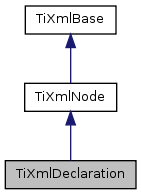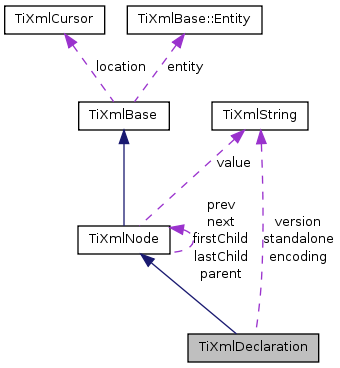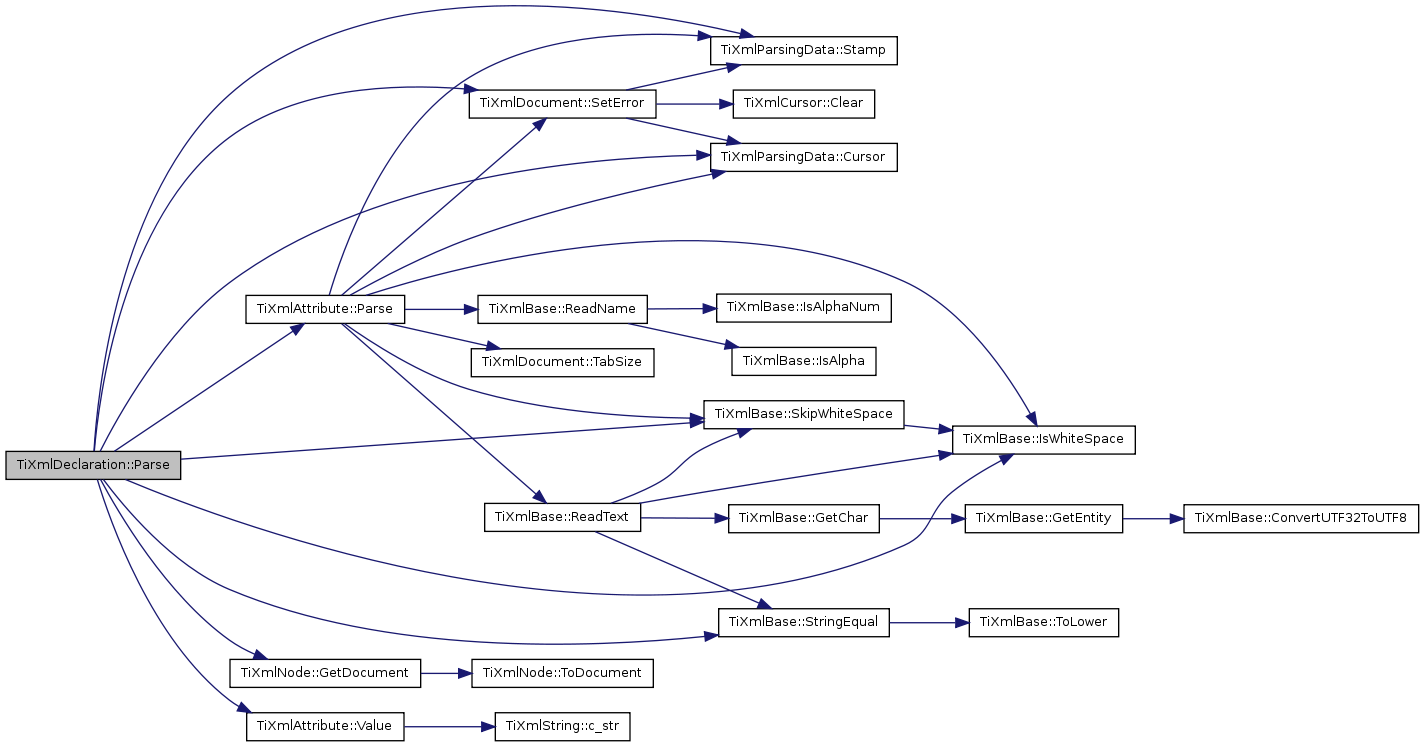#include <tinyxml.h>


Public Member Functions
- TiXmlDeclaration ()
- TiXmlDeclaration (const char *_version, const char *_encoding, const char *_standalone)
- TiXmlDeclaration (const TiXmlDeclaration ©)
- void operator= (const TiXmlDeclaration ©)
- virtual ~TiXmlDeclaration ()
- const char * Version () const
- const char * Encoding () const
- const char * Standalone () const
- virtual TiXmlNode * Clone () const
- virtual void Print (FILE *cfile, int depth) const
- virtual const char * Parse (const char *p, TiXmlParsingData *data, TiXmlEncoding encoding)
Protected Member Functions
- void CopyTo (TiXmlDeclaration *target) const
- virtual void StreamOut (TiXmlOutStream *out) const
Private Attributes
Detailed Description
In correct XML the declaration is the first entry in the file.
<?xml version="1.0" standalone="yes"?>
TinyXml will happily read or write files without a declaration, however. There are 3 possible attributes to the declaration: version, encoding, and standalone.
Note: In this version of the code, the attributes are handled as special cases, not generic attributes, simply because there can only be at most 3 and they are always the same.
Constructor & Destructor Documentation
| TiXmlDeclaration::TiXmlDeclaration | ( | ) | [inline] |
| TiXmlDeclaration::TiXmlDeclaration | ( | const char * | _version, | |
| const char * | _encoding, | |||
| const char * | _standalone | |||
| ) |
Construct.
References encoding, standalone, and version.
| TiXmlDeclaration::TiXmlDeclaration | ( | const TiXmlDeclaration & | copy | ) |
| virtual TiXmlDeclaration::~TiXmlDeclaration | ( | ) | [inline, virtual] |
Member Function Documentation
| void TiXmlDeclaration::operator= | ( | const TiXmlDeclaration & | copy | ) |
| const char* TiXmlDeclaration::Version | ( | ) | const [inline] |
Version. Will return an empty string if none was found.
References TiXmlString::c_str(), and version.

| const char* TiXmlDeclaration::Encoding | ( | ) | const [inline] |
Encoding. Will return an empty string if none was found.
References TiXmlString::c_str(), and encoding.
Referenced by TiXmlDocument::Parse().


| const char* TiXmlDeclaration::Standalone | ( | ) | const [inline] |
Is this a standalone document?
References TiXmlString::c_str(), and standalone.

| TiXmlNode * TiXmlDeclaration::Clone | ( | ) | const [virtual] |
Creates a copy of this Declaration and returns it.
Implements TiXmlNode.
References CopyTo(), and TiXmlDeclaration().

| void TiXmlDeclaration::Print | ( | FILE * | cfile, | |
| int | depth | |||
| ) | const [virtual] |
Print this declaration to a FILE stream.
Implements TiXmlBase.
References TiXmlString::c_str(), TiXmlString::empty(), encoding, standalone, and version.

| const char * TiXmlDeclaration::Parse | ( | const char * | p, | |
| TiXmlParsingData * | data, | |||
| TiXmlEncoding | encoding | |||
| ) | [virtual] |
Implements TiXmlBase.
References TiXmlParsingData::Cursor(), encoding, TiXmlNode::GetDocument(), TiXmlBase::IsWhiteSpace(), TiXmlBase::location, TiXmlAttribute::Parse(), TiXmlDocument::SetError(), TiXmlBase::SkipWhiteSpace(), TiXmlParsingData::Stamp(), standalone, TiXmlBase::StringEqual(), TiXmlBase::TIXML_ERROR_PARSING_DECLARATION, TiXmlAttribute::Value(), and version.

| void TiXmlDeclaration::CopyTo | ( | TiXmlDeclaration * | target | ) | const [protected] |
References encoding, standalone, and version.
Referenced by Clone(), operator=(), and TiXmlDeclaration().

| void TiXmlDeclaration::StreamOut | ( | TiXmlOutStream * | out | ) | const [protected, virtual] |
Implements TiXmlBase.
References TiXmlString::empty(), encoding, TiXmlBase::PutString(), standalone, and version.

Member Data Documentation
TiXmlString TiXmlDeclaration::version [private] |
Referenced by CopyTo(), Parse(), Print(), StreamOut(), TiXmlDeclaration(), and Version().
TiXmlString TiXmlDeclaration::encoding [private] |
Referenced by CopyTo(), Encoding(), Parse(), Print(), StreamOut(), and TiXmlDeclaration().
TiXmlString TiXmlDeclaration::standalone [private] |
Referenced by CopyTo(), Parse(), Print(), Standalone(), StreamOut(), and TiXmlDeclaration().
The documentation for this class was generated from the following files:



 1.7.1
1.7.1